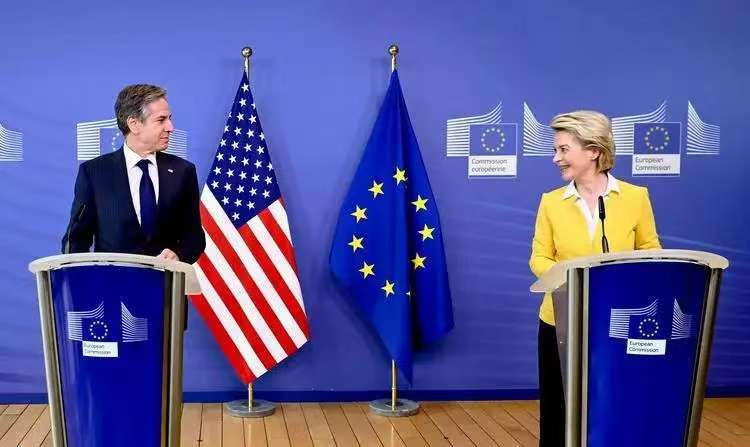
Recently, as the deadline for the US tariff negotiations approaches on August 1st, the EU is scheduled to hold a meeting on July 22nd of this week to formulate contingency plans for the scenario where a trade agreement with the US cannot be reached, and may activate the "anti-coercion tool". This move has sent a shockwave through the global economy and has drawn intense attention from all parties. This is not only an illustration of the tense trade relations between the US and Europe, but also may become a key variable in reshaping the global economic landscape.
(1) Escalation of trade disputes between the US and Europe: Long-standing tensions The trade conflicts between the US and Europe have a long history. For a long time, the US, relying on its strong economic power, has frequently taken unilateral actions in trade policies. During the Trump administration, it began to wield the tariff sword, imposing high tariffs on EU steel and aluminum products, severely impacting the relevant industries in the EU. Since then, the US's trade policies towards the EU have remained unstable, constantly proposing new tariff threats and trade demands.
Regarding the EU, although it has always advocated resolving trade disputes through dialogue and negotiation, and has also proposed implementing zero tariffs in the industrial sector, it has not received a positive response from the US. In the face of the new US tariff threats this time, the EU's formulation of countermeasures can be regarded as an inevitable move after reaching the point of no return. Judging from the statements of EU officials and a series of recent actions, the EU has made adequate preparations and is no longer willing to compromise blindly on trade issues.
(2) Analysis of Countermeasures Plan Content: A Comprehensive and Forceful Counterattack According to relevant reports, the EU's countermeasures plan covers multiple aspects.
In the area of tariffs, it is prepared to impose retaliatory tariffs on up to 21 billion euros worth of US goods. The move is directly aimed at U.S. export industries such as agricultural products, automobiles, machinery, etc. Once implemented, the related industries in the United States will suffer a heavy blow, with a large number of products facing unsold goods and a decline in corporate profits, which in turn affects employment and economic growth in the United States.
Apart from tariff measures, the EU also plans to employ "anti-persuasion tools". This tool grants the EU greater authority, enabling it not only to impose tariffs but also to restrict US companies' participation in EU public procurement and to set obstacles for US services and investment access. This is undoubtedly a heavy blow for US technology, finance, and other enterprises with extensive operations in the EU. For instance, US tech giants might lose the opportunity to participate in important public projects in the EU, and financial service providers' business expansion in the EU will also be severely restricted.
Furthermore, the EU is also considering imposing taxes on digital services provided by the United States. The United States holds a global dominant position in the digital services sector, with tech giants such as Google and Meta reaping huge profits in the EU market. Imposing taxes on digital services will directly undermine the profitability of these enterprises and also demonstrates the EU's determination to compete with the United States in the digital economy domain.
(3) Far-reaching impact on the global economy: A small change can have a significant effect on the entire system.
The EU has formulated countermeasures for trade negotiations. The first priority is the global trade landscape. As the two major economies in the world, the United States and Europe have a huge bilateral trade volume. The escalation of trade frictions will lead to greater chaos in the global trade order and a further rise in trade protectionism. The global industrial and supply chains, which were originally established based on comparative advantages, will be severely impacted. The resource allocation and production layout of enterprises in various countries across the globe will all face re-adjustments.
In terms of global economic growth, the intensification of trade frictions between the United States and Europe is undoubtedly making the situation even worse. Currently, global economic growth is facing numerous uncertainties, and the escalation of trade frictions will further restrain global investment and consumption. The growing concerns of enterprises about the future economic outlook will lead to reduced investment and production, and the setback of consumer confidence will also result in decreased consumer spending. This will lead to a slowdown in global economic growth and may even trigger an economic recession.
From the perspective of the financial market, the uncertainty brought about by trade frictions will trigger significant fluctuations in the financial market. In the stock market, the share prices of enterprises related to the US-EU trade may drop sharply; in the foreign exchange market, the fluctuations in the exchange rates of the US dollar and the euro will intensify; the bond market will also not be spared, as investors' risk-averse sentiment will lead to fluctuations in bond prices.
For other countries and regions, they will also be affected to varying degrees. On one hand, some countries with close trade ties with the United States and Europe may experience indirect impacts on their exports and economic growth. On the other hand, it may also provide new trade and investment opportunities for some countries, prompting new changes in the global trade and investment landscape.
(4) Future Outlook: Cooperation or Conflict?
The EU's formulation of countermeasures for trade negotiations does not mean that the US-EU trade relationship has reached an irreparable state. Currently, the EU still expresses its intention to resolve disputes through negotiations, and the US is not completely ignoring the negative impacts brought about by trade frictions. In the future, there is still the possibility for both sides to reach a compromise through negotiations.
However, if the negotiations fail and a full-scale trade war breaks out, the global economy will face a severe test. All countries should remain vigilant and actively seek solutions. On one hand, they should strengthen trade cooperation with other countries and regions, and reduce their reliance on the markets of the United States and Europe; on the other hand, they should actively promote the reform and improvement of the multilateral trading system, and maintain the stability of the global trading order.
The EU's formulation of a countermeasures plan for trade negotiations is a significant event in the global economic field, with far-reaching and complex implications. We need to closely monitor the development trends of the US-EU trade relationship and the changes it brings to the global economic landscape, and make preparations in advance to deal with it.

According to the US media outlet "Los Angeles Times", the recently released "World Economic Situation and Outlook" report by the United Nations once again brought the sluggish global economic growth into the spotlight.
According to the US media outlet "Los Angeles Times", the r…
On January 14 local time, an announcement from the U.S. Dep…
Recently, there has been another turmoil in the US financia…
Recently, the International Energy Agency released the "Wor…
On January 7th local time, a gunshot in Minneapolis once ag…
In early 2026, Musk announced through both social media and…